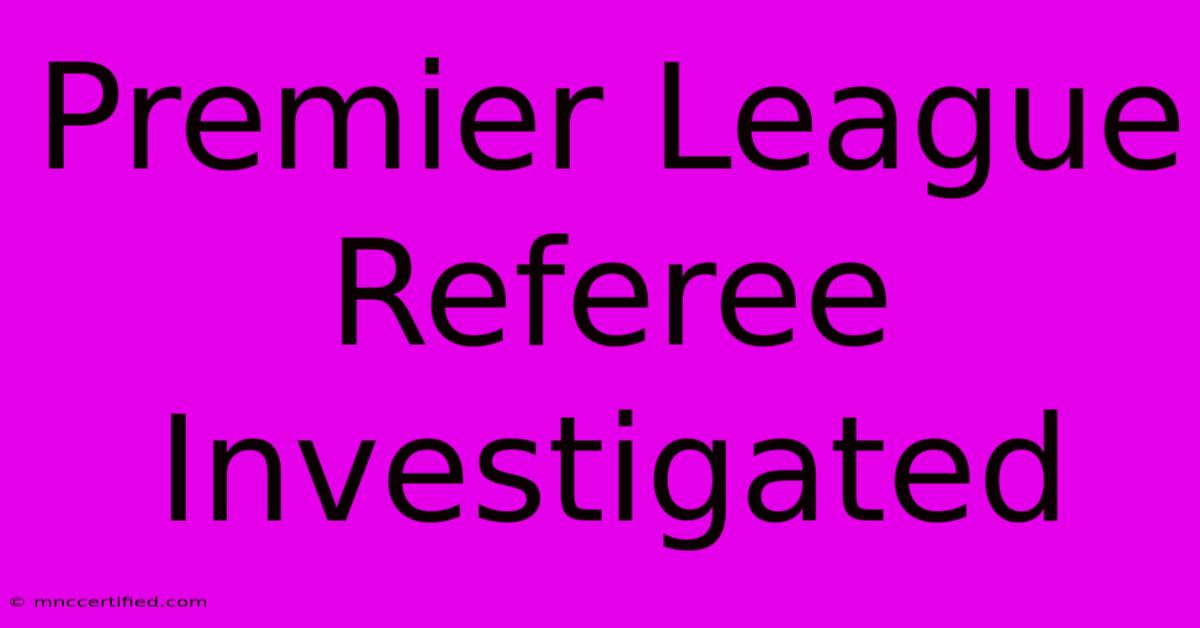Premier League Referee Investigated

Table of Contents
Premier League Referee Investigated: A Deeper Look into Recent Controversies
The Premier League, renowned for its high-octane football and global appeal, is also no stranger to controversy. Recently, the spotlight has fallen sharply on the officiating, with a Premier League referee investigated for their performance in a high-profile match. This article delves into the intricacies of these investigations, exploring the processes involved, the potential consequences, and the wider impact on the league's integrity.
Understanding the Investigative Process
When a Premier League referee is investigated, it's usually triggered by a significant incident or series of questionable decisions during a game. These incidents might include:
- Missed penalties: Failure to award a clear penalty kick can spark outrage among fans and teams.
- Incorrect red cards/yellow cards: Wrongful dismissals or lenient treatment of fouls can significantly alter the course of a match and the subsequent results.
- Controversial offside calls: With the introduction of VAR (Video Assistant Referee), even these seemingly straightforward calls can become sources of intense scrutiny.
- Failure to properly manage the game: This includes poor control of players, inadequate communication, and a general lack of authority on the pitch.
The Professional Game Match Officials Limited (PGMOL), the body responsible for appointing and overseeing Premier League referees, initiates a thorough review process. This involves:
- Reviewing match footage: A detailed analysis of the entire game, focusing on the decisions under question.
- Consulting with other officials: Seeking input from fellow referees and VAR officials to gain a broader perspective.
- Analyzing referee reports: Examining the referee's own post-match report, which provides their justification for the decisions made.
Transparency and Public Accountability
While the specifics of individual investigations are usually kept confidential to protect the integrity of the process, the PGMOL often releases statements acknowledging an ongoing investigation. This commitment to transparency, however imperfect, helps maintain public confidence in the officiating process. The lack of complete transparency, however, remains a point of contention for many fans. The need for better communication between the PGMOL and the public is a frequently discussed topic.
Potential Consequences for Investigated Referees
The consequences for a Premier League referee facing investigation vary depending on the severity of the alleged misconduct. Possible outcomes include:
- Written warnings: A formal reprimand for minor errors in judgment.
- Suspension: A temporary removal from officiating duties, ranging from a few games to a longer period.
- Demotion: A transfer to lower leagues, reflecting a loss of confidence in the referee's ability to perform at the Premier League level.
- Dismissal: In extreme cases of misconduct or repeated errors, the referee may be dismissed from the PGMOL altogether.
The decisions made by the PGMOL are often influenced by public opinion, but ultimately rest on a comprehensive assessment of the referee's performance and adherence to the Laws of the Game. However, the lack of a clear and public appeal process for referees adds to the feeling of opacity surrounding these decisions.
The Wider Impact on the Premier League
Investigations into Premier League referees have a ripple effect throughout the league. They affect:
- Team morale and performance: Controversial decisions can significantly impact team morale and potentially influence subsequent match results.
- Fan engagement and loyalty: Inaccurate or inconsistent officiating can damage fan trust and engagement with the league.
- League reputation: High-profile officiating controversies can tarnish the Premier League's global reputation.
Conclusion:
The investigation of a Premier League referee is a serious matter with significant implications for the league's integrity and overall image. While the current system seeks to ensure fairness and accountability, there's a clear need for enhanced transparency and a more robust appeals process to improve public trust and confidence in the officiating of this globally popular sport. Further discussion regarding improved communication strategies and increased public accountability will be crucial for the future of Premier League refereeing.

Thank you for visiting our website wich cover about Premier League Referee Investigated. We hope the information provided has been useful to you. Feel free to contact us if you have any questions or need further assistance. See you next time and dont miss to bookmark.
Featured Posts
-
Trump Taps Bhattacharya For Nih
Nov 28, 2024
-
Giants Release Jones Vikings Sign Qb
Nov 28, 2024
-
Best Place To Invest In Airbnb
Nov 28, 2024
-
Vanderpump Rules New Cast Season 12
Nov 28, 2024
-
Florida Store Hours Publix Walmart Cvs
Nov 28, 2024